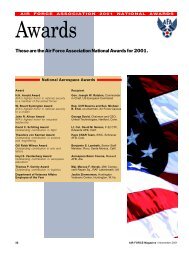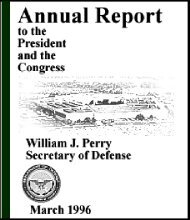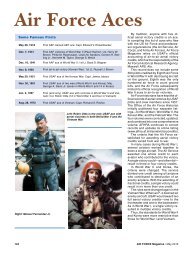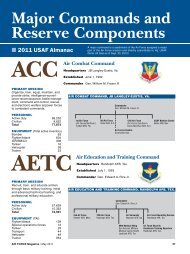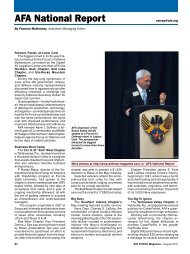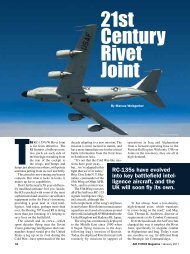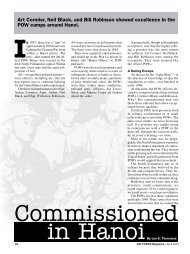- Page 2 and 3: MESSAGE OF THE SECRETARY OF DEFENSE
- Page 4 and 5: MESSAGE OF THE SECRETARY OF DEFENSE
- Page 8 and 9: eadiness, modernization, and infras
- Page 10 and 11: host-nation support for U.S. forces
- Page 12 and 13: • Underwrite regional stability b
- Page 14 and 15: and maintained its portion of the z
- Page 16 and 17: The Department supports the counter
- Page 18 and 19: CONCLUSION America's defense strate
- Page 20 and 21: • Port call and other force visit
- Page 22 and 23: In some cases, the United States wi
- Page 24 and 25: that exists today. Until START II i
- Page 26 and 27: accurately from medium and high alt
- Page 28 and 29: carriers responding to crises. Thes
- Page 30 and 31: ARNG and USAR have implemented tier
- Page 32 and 33: Forces must meet standards in terms
- Page 34 and 35: level. By looking at recurring SORT
- Page 36 and 37: Another dimension of the problem wi
- Page 38 and 39: Created in conjunction with the SRO
- Page 40 and 41: anticipated threat forces, and the
- Page 42 and 43: and assessing near term readiness.
- Page 44 and 45: The Department has long recognized
- Page 46 and 47: Services, commanders, and leaders a
- Page 48 and 49: Child Development Program Today, ov
- Page 50 and 51: families return to civilian life ea
- Page 52 and 53: programs include public awareness c
- Page 54 and 55: a needed respite. During FY 1996, A
- Page 56 and 57:
Chapter 6 COUNTERPROLIFERATION AND
- Page 58 and 59:
state, effective upon entry into fo
- Page 60 and 61:
also monitors DoD-wide efforts at t
- Page 62 and 63:
organized crime activities in the f
- Page 64 and 65:
associated delivery vehicles will,
- Page 66 and 67:
partnerships with allies and friend
- Page 68 and 69:
START II's reductions are to be com
- Page 70 and 71:
U.S. TMD programs are going forward
- Page 72 and 73:
Chapter 7 COOPERATIVE THREAT REDUCT
- Page 74 and 75:
PROGRESS IN CTR IMPLEMENTATION To m
- Page 76 and 77:
of WMD; proliferation prevention ef
- Page 78 and 79:
in helping Ukraine develop a nation
- Page 80 and 81:
econnaissance complex are key enabl
- Page 82 and 83:
capability. For example, the Medium
- Page 84 and 85:
Chapter 9 RESPONDING TO TERRORISM T
- Page 86 and 87:
Technological advances may have the
- Page 88 and 89:
protection training for deploying f
- Page 90 and 91:
Higher levels of recruit quality se
- Page 92 and 93:
The Assistant Secretary of Defense
- Page 94 and 95:
drawdown, but that is simply not th
- Page 96 and 97:
• Designing components of a futur
- Page 98 and 99:
with five of seven contracts, cover
- Page 100 and 101:
comprehensive report on the results
- Page 102 and 103:
• Joint ventures, including share
- Page 104 and 105:
many of the approaches that have pr
- Page 106 and 107:
Chapter 11 FINANCIAL MANAGEMENT REF
- Page 108 and 109:
• The Defense Transportation Paym
- Page 110 and 111:
Funds Distribution and Internal Con
- Page 112 and 113:
program at the DFAS Centers and Ope
- Page 114 and 115:
To foster standardization beyond da
- Page 116 and 117:
Many of the important recommendatio
- Page 118 and 119:
COMMERCIAL ADVOCATES FORUM The Depu
- Page 120 and 121:
GOVERNMENT PURCHASE CARD DoD establ
- Page 122 and 123:
to reduce cycle time. The Services
- Page 124 and 125:
government agencies interested in t
- Page 126 and 127:
Assuring Affordable Access to Leadi
- Page 128 and 129:
world-class SoS wafers. Process imp
- Page 130 and 131:
cargo containers used for transport
- Page 132 and 133:
Defense Export Loan Guarantee Progr
- Page 134 and 135:
Inventory Control Points. DoD has r
- Page 136 and 137:
junior or one senior enlisted membe
- Page 138 and 139:
BRAC Costs and Savings ($ Billions)
- Page 140 and 141:
Chapter 14 ENVIRONMENTAL SECURITY A
- Page 142 and 143:
In addition to incorporating pollut
- Page 144 and 145:
• Provide safe drinking water to
- Page 146 and 147:
under the Superfund Amendments and
- Page 148 and 149:
the United States and other nations
- Page 150 and 151:
Chapter 15 LOGISTICS MEETING THE LO
- Page 152 and 153:
Each of the Services and DLA have e
- Page 154 and 155:
During FY 1996, the Services and DL
- Page 156 and 157:
transportation systems have been ap
- Page 158 and 159:
REENGINEERING TRANSPORTATION In May
- Page 160 and 161:
Chapter 16 SCIENCE AND TECHNOLOGY T
- Page 162 and 163:
PROVIDING FUTURE JOINT WARFIGHTING
- Page 164 and 165:
and littoral engagements. Technolog
- Page 166 and 167:
demonstrations is focused on counte
- Page 168 and 169:
Sensors, Electronics, and Battlespa
- Page 170 and 171:
techniques for protecting aircraft
- Page 172 and 173:
fundamental advances relevant to cu
- Page 174 and 175:
an S&T Affordability Policy has bee
- Page 176 and 177:
• Phase II - Force Buildup. Heavy
- Page 178 and 179:
American leadership remains crucial
- Page 180 and 181:
enough to damage two ships seriousl
- Page 182 and 183:
Note: FWE quantities are based on t
- Page 184 and 185:
Nuclear Forces chapter). Also inclu
- Page 186 and 187:
attle groups may not be available.
- Page 188 and 189:
Mobility Forces Mobility forces - a
- Page 190 and 191:
transporting fuels. In addition, th
- Page 192 and 193:
The Navy has taken steps to ensure
- Page 194 and 195:
• Increases procurement funding t
- Page 196 and 197:
Successful execution of the moderni
- Page 198 and 199:
to cruise at supersonic speeds, and
- Page 200 and 201:
JSF RDT&E (DARPA) RDT&E (Air Force)
- Page 202 and 203:
SPECIALIZED FORCES Air Force E-3 an
- Page 204 and 205:
Joint Direct Attack Munition (JDAM)
- Page 206 and 207:
AMPHIBIOUS SHIPS The key to moderni
- Page 208 and 209:
deferral of the lead ship, funds ha
- Page 210 and 211:
Ship Construction SSN-23 NSSN DDG-5
- Page 212 and 213:
MISSILES AND MUNITIONS Army Tactica
- Page 214 and 215:
Bradley Fighting Vehicle Upgrade. T
- Page 216 and 217:
FMTV RDT&E Procurement Support Syst
- Page 218 and 219:
Airlift C-17 RDT&E Procurement C-13
- Page 220 and 221:
military forces and civil authoriti
- Page 222 and 223:
for U.S. presence, reducing U.S. ac
- Page 224 and 225:
Air Force SOF are organized into on
- Page 226 and 227:
Chapter 19 SPACE FORCES The United
- Page 228 and 229:
Satellite Systems FY 1997 Space-Bas
- Page 230 and 231:
DoD operates space and ground-based
- Page 232 and 233:
Force Application The force applica
- Page 234 and 235:
Navigation Satellites The Global Po
- Page 236 and 237:
Land-Based Intercontinental Ballist
- Page 238 and 239:
new relationship between the United
- Page 240 and 241:
Chapter 21 BALLISTIC MISSILE DEFENS
- Page 242 and 243:
Upper-tier systems are necessary to
- Page 244 and 245:
contiguous 48 states. Only a North
- Page 246 and 247:
Chapter 22 NATIONAL GUARD AND RESER
- Page 248 and 249:
Reserve, and civilian personnel und
- Page 250 and 251:
Defense Authorization Act and conti
- Page 252 and 253:
Policy has become a reality, the co
- Page 254 and 255:
duty, receive a refund of tuition a
- Page 256 and 257:
six brigades containing CS/CSS orga
- Page 258 and 259:
Chapter 23 COMMAND, CONTROL, COMMUN
- Page 260 and 261:
DoD continues to pursue battlefield
- Page 262 and 263:
standard data links in tactical pla
- Page 264 and 265:
developed this CD-ROM as a self-con
- Page 266 and 267:
demonstration flight mishap, DarkSt
- Page 268 and 269:
African states; conventional target
- Page 270 and 271:
National Imagery and Mapping Agency
- Page 272 and 273:
NSA/CSS provides time-critical supp
- Page 274 and 275:
DoD budget authority requested for
- Page 276 and 277:
Recapitalization of U.S. Forces Dep
- Page 278 and 279:
In its FY 1997 defense bill, Congre
- Page 280 and 281:
The Army reassures friends and alli
- Page 282 and 283:
integral part of a joint or combine
- Page 284 and 285:
REPORT OF THE SECRETARY OF THE NAVY
- Page 286 and 287:
security tasking, anytime and anywh
- Page 288 and 289:
Maneuver operations from the sea pr
- Page 290 and 291:
The transformation process of makin
- Page 292 and 293:
equirements. Whether giving new lif
- Page 294 and 295:
as force modernization initiatives.
- Page 296 and 297:
REPORT OF THE SECRETARY OF THE AIR
- Page 298 and 299:
OPERATING TEMPO/PERSONNEL TEMPO Sin
- Page 300 and 301:
• Rapid global mobility. • Prec
- Page 302 and 303:
PRECISION ENGAGEMENT When one think
- Page 304 and 305:
The next essential element in effec
- Page 306 and 307:
The key to our success in the suppo
- Page 308 and 309:
REPORT OF THE CHAIRMAN OF THE RESER
- Page 310 and 311:
The Services have lived with the To
- Page 312 and 313:
extensively by the Budget Enforceme
- Page 314 and 315:
DEFENSE SHARES OF ECONOMIC AGGREGAT
- Page 316 and 317:
U.S. MILITAR Y PERSONNEL IN FOREIGN
- Page 318 and 319:
DEPARTMENT OF DEFENSE GENERAL PURPO
- Page 320 and 321:
Appendix E GOLDWATER-NICHOLS ACT IM
- Page 322 and 323:
ANALYSIS OF THE ASSIGNMENT WHERE OF
- Page 324 and 325:
The following organizations have jo
- Page 326 and 327:
Appendix F DEFENSE ACQUISITION WORK
- Page 328 and 329:
wide), up slightly from FY 1995's 2
- Page 330 and 331:
EDUCATION The Department again prov
- Page 332 and 333:
Improved Opportunities The Services
- Page 334 and 335:
Appendix G PERSONNEL READINESS FACT
- Page 336 and 337:
RETENTION TRENDS The Department of
- Page 338 and 339:
does not allow extended in-depth di


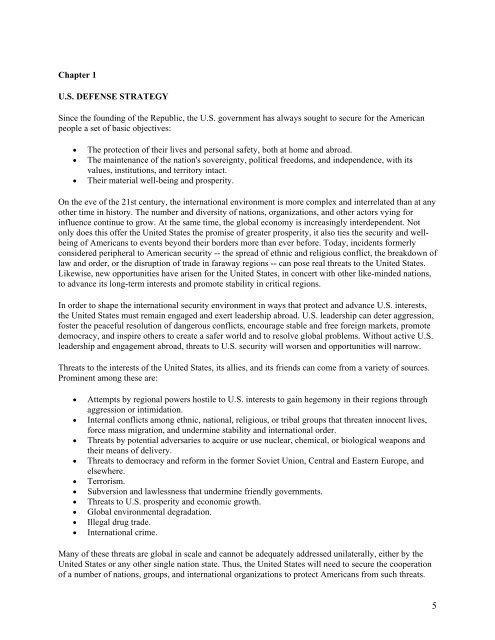
![[PDF] Foulois - Air Force Magazine](https://img.yumpu.com/13391007/1/190x253/pdf-foulois-air-force-magazine.jpg?quality=85)


